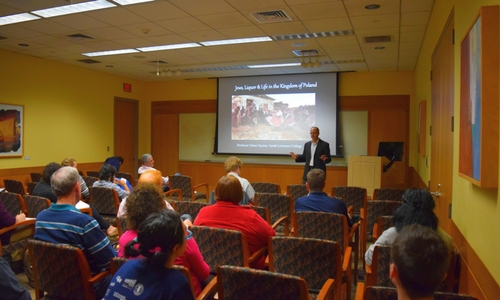By Jillian Chambers
 The Center for Judaic Studies hosted Professor Glenn Dynner of Sarah Lawrence College on October 20. He presented his talk, “Jews, Liquor, and Life in Eastern Europe” to an enthusiastic audience in the Class of 1947 Room in the Homer Babbidge Library. Dynner showed how Eastern Europe became a safe haven for Jews in the 1800s and how changes in social dynamics later forced them out.
The Center for Judaic Studies hosted Professor Glenn Dynner of Sarah Lawrence College on October 20. He presented his talk, “Jews, Liquor, and Life in Eastern Europe” to an enthusiastic audience in the Class of 1947 Room in the Homer Babbidge Library. Dynner showed how Eastern Europe became a safe haven for Jews in the 1800s and how changes in social dynamics later forced them out.
According to Dynner, while Jews and Christians in the 1800s did not enjoy coexistence in a social sense, they came together through the Jewish tavern. When grain exports fell in Poland, the excess grain became the basis for a burgeoning vodka business. Because the nobility believed Jews were less likely to drink the product than Catholics, who were known to drink socially after events like church, Jews were granted rights to own taverns. Using this general view of Jewish sobriety, Jewish families were able to come to Poland and make money in the tavern business.
Problems later arose, as Dynner described, when vodka became stronger and cheaper due to advances in distilling techniques. Drunkenness became rampant and it fostered a tone of cultural superiority, where citizens who frequented the taverns were under the impression that “the Jew is sober because he wants to exploit you.” Anti-Semitism increased in these communities until eventually the Tsars drove the Jews out of the liquor trade by increasing taxes on taverns, or by expelling them to the countryside in Pogroms. They saw the Jews as the cause for an epidemic of alcoholism, rather than the nobility who supplied them with the alcohol. However, all this did was push the tavern system underground, Dynner explained.
Professor Dynner’s presentations showed the audience the utility of applying historical lessons in modern times. We thank Professor Dynner for coming out and educating us about the Eastern European Jewish experience!